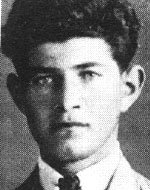Chizik, Ephraim
Son of Bryna and Samuel. He was born in Tashmopol, Russia in 1897, and in 1906 immigrated with his family to Eretz Israel. At first the family lived near the Kinneret, and then moved to the moshava from Malhamia. Young Ephraim was very attached to animals and later went to Jaffa to study there in a course in animal medicine from the Agricultural Center. Among all his acquaintances, he was known as a young man with feelings. He was one of the first to rise on the ground in the Jezreel Valley and later worked in the Pinhas Rotenberg power plant near the Jordan as a guard and laborer. After Sarah, his older sister, was killed on the 11th of Adar, on the defense of Tel Hai, he decided to go to defense duty whenever necessary, and he did. In the events of May 1, 1921, he was in a dangerous position between Tel Aviv and the Neve Shalom neighborhood of Jaffa, and as Arab rioters tried to make their way toward Tel Aviv, he was slightly wounded. He then returned to Malhamia to live and work near his parents. When the bloody riots broke out in 1929, he and his brother Aaron went to Jerusalem to help capture Kamel Effendi, who was responsible for the fall of Joseph Trumpeldor and his comrades in Tel Hai. When Ephraim returned, he brought information about the grave security situation of the Jews of Jerusalem. The Hagana headquarters sent him to Hulda, a town of a group of farmers in the south of the country. Where he served as a commander of one of the Haganah groups in the Yishuv and as a first aid supervisor. In the desperate battle that took place on the 2th of Av, 26.8.1929, Efraim moved from the settlement yard to a semi-open house and was hit by a bullet fired from a nearby grove, and he ran about ten steps and fell. In memory of Ephraim and to the battle of heroism, the poet Yehuda Karni dedicated his poem “Sons of Hulda” in which he described the course of the battle and the moment when “Ephraim fell alive three and twenty.” Ephraim was also commemorated in the monument by the hands of the sculptor Batya Lishanski, placed on the battlefield of Old Hulda.
